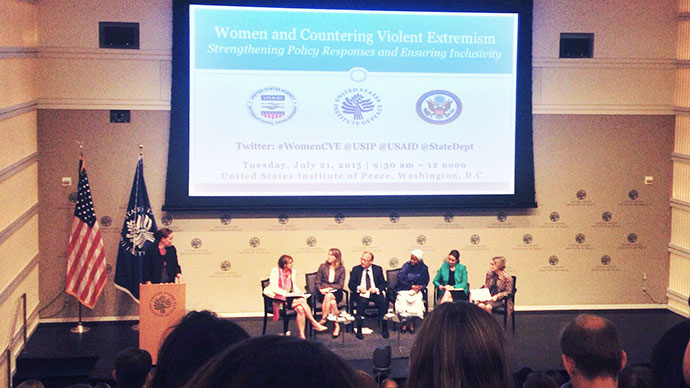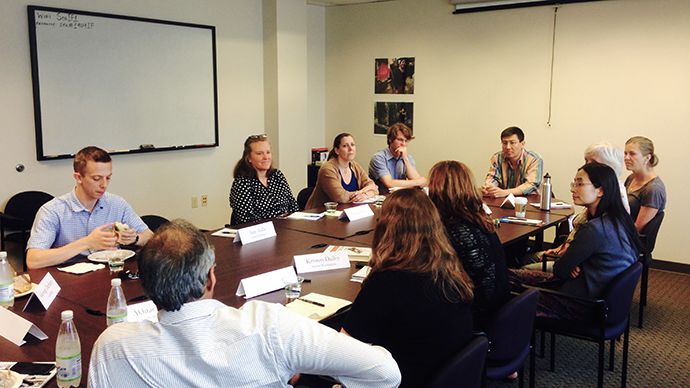Blog
Posted on July 24, 2015
By Holly Koch
“What price tag can you put on a human life?”
The UN Secretary General’s Special Representative for Sexual Violence in Conflict, Zainab Hawa Bangura, answered her own question by reading the “price list” used by ISIS in what she called “nothing short of a revival of the slave trade.”
 On July 21, 500 guests gathered at the US Institute of Peace (USIP) for a distinguished discussion on Women and Countering Violent Extremism (CVE) and sat riveted as Ms. Bangura detailed the ways in which extremist groups use women as currency while they sell, barter and incentivize recruits in their efforts to consolidate power.
On July 21, 500 guests gathered at the US Institute of Peace (USIP) for a distinguished discussion on Women and Countering Violent Extremism (CVE) and sat riveted as Ms. Bangura detailed the ways in which extremist groups use women as currency while they sell, barter and incentivize recruits in their efforts to consolidate power.
Continue Reading
Posted on July 9, 2015

Photo Credit: Landesa
Seattle International Foundation (SIF) and The Seattle Foundation will host a donor delegation to India on October 9-18 where participants will see first-hand the work of Global Washington members. Seattle-area donors and experts will visit leading Seattle-area institutions such as Landesa, PATH, SightLife, Splash and University of Washington. Delegates will also have opportunities to engage with local business and nonprofit leaders, philanthropists, and visit cultural and historical sites. Field site visits and meetings will span a variety of issue areas including health, land rights, leadership development, micro-finance, technology and women’s rights.
Global Washington member Emirates Airline is offering a discount for GlobalWA members traveling to India. Click here to learn more and email us for the promo code before you book your flight.
Click here to learn all about this exciting delegation to India: www.seaif.org/2015IndiaDelegation
For more information contact Michele Frix, Director of Programs, at mfrix@seaif.org or 206.547.9335.
Posted on June 25, 2015
By Kaitlin Marshall
 On June 24, Global Washington members gathered to meet Kentaro Toyama and discuss his new book, Geek Heresy: Rescuing Social Change from the Cult of Technology. An award-winning computer scientist and co-founder of Microsoft Research India, Toyama spent more than a decade designing technologies meant to address education, health and global poverty before coming to a radical conclusion. “Even in an age of amazing technology, social progress depends on human changes that gadgets can’t deliver,” says Toyama. This conclusion is the crux of his book, in which he argues that technology is not the solution to society’s greatest ills.
On June 24, Global Washington members gathered to meet Kentaro Toyama and discuss his new book, Geek Heresy: Rescuing Social Change from the Cult of Technology. An award-winning computer scientist and co-founder of Microsoft Research India, Toyama spent more than a decade designing technologies meant to address education, health and global poverty before coming to a radical conclusion. “Even in an age of amazing technology, social progress depends on human changes that gadgets can’t deliver,” says Toyama. This conclusion is the crux of his book, in which he argues that technology is not the solution to society’s greatest ills.
Continue Reading
 On July 21, 500 guests gathered at the US Institute of Peace (USIP) for a distinguished discussion on Women and Countering Violent Extremism (CVE) and sat riveted as Ms. Bangura detailed the ways in which extremist groups use women as currency while they sell, barter and incentivize recruits in their efforts to consolidate power.
On July 21, 500 guests gathered at the US Institute of Peace (USIP) for a distinguished discussion on Women and Countering Violent Extremism (CVE) and sat riveted as Ms. Bangura detailed the ways in which extremist groups use women as currency while they sell, barter and incentivize recruits in their efforts to consolidate power.
 On June 24, Global Washington members gathered to meet Kentaro Toyama and discuss his new book, Geek Heresy: Rescuing Social Change from the Cult of Technology. An award-winning computer scientist and co-founder of Microsoft Research India, Toyama spent more than a decade designing technologies meant to address education, health and global poverty before coming to a radical conclusion. “Even in an age of amazing technology, social progress depends on human changes that gadgets can’t deliver,” says Toyama. This conclusion is the crux of his book, in which he argues that technology is not the solution to society’s greatest ills.
On June 24, Global Washington members gathered to meet Kentaro Toyama and discuss his new book, Geek Heresy: Rescuing Social Change from the Cult of Technology. An award-winning computer scientist and co-founder of Microsoft Research India, Toyama spent more than a decade designing technologies meant to address education, health and global poverty before coming to a radical conclusion. “Even in an age of amazing technology, social progress depends on human changes that gadgets can’t deliver,” says Toyama. This conclusion is the crux of his book, in which he argues that technology is not the solution to society’s greatest ills.